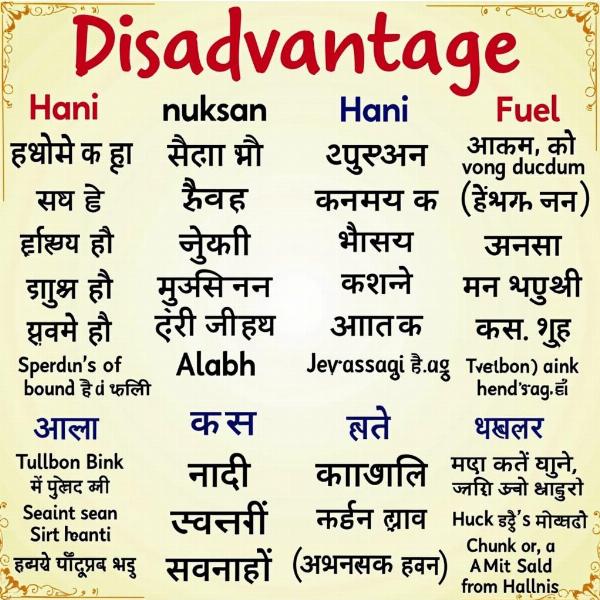Understanding the meaning of “disadvantage” in Hindi is crucial for effective communication and translation. Whether you’re dealing with legal documents, business contracts, or everyday conversations, knowing the nuances of this word can prevent misunderstandings. This article explores the various Hindi translations of “disadvantage,” their contextual usage, and common related phrases.
Exploring Hindi Translations of “Disadvantage”
The Hindi language offers several ways to express the concept of “disadvantage,” each with subtle differences in meaning and usage. Some of the most common translations include:
-
हानि (Haani): This word generally refers to loss or damage, and can be used in contexts where a disadvantage results in a tangible loss. For example, a business deal that falls through due to unforeseen circumstances could be described as a हानि.
-
नुकसान (Nuksan): Similar to हानि, नुकसान also signifies loss or harm. It can be used more broadly to describe both physical and intangible disadvantages, such as the नुकसान to one’s reputation.
-
अलाभ (Alaabh): This term emphasizes the lack of gain or profit, highlighting the missed opportunity aspect of a disadvantage. For example, not investing in a promising venture could be considered an अलाभ.
-
कमज़ोरी (Kamzori): This word translates to “weakness” and is used to describe inherent disadvantages or vulnerabilities. A physical ailment, for example, could be considered a कमज़ोरी.
-
गैर फायदेमंद (Gair Faydemand): This phrase translates directly to “non-beneficial” and is often used in formal contexts. It’s a more neutral way to express disadvantage, focusing on the lack of positive outcomes.
 Hindi Translation of Disadvantage
Hindi Translation of Disadvantage
Contextual Usage of “Disadvantage” in Hindi
Choosing the appropriate Hindi translation for “disadvantage” depends heavily on the context. For instance, in a business setting, “हानि” or “नुकसान” might be suitable when discussing financial losses. However, in a social context, “कमज़ोरी” might be more appropriate when referring to a personal limitation.
Common Phrases Related to Disadvantage in Hindi
Understanding common phrases related to disadvantage can further enhance your understanding of the concept. Here are a few examples:
-
मुश्किल में होना (Mushkil mein hona): To be in difficulty.
-
पीछे रह जाना (Peechhe reh jana): To be left behind.
-
कमतर होना (Kamtar hona): To be inferior or lacking.
Disadvantage in Different Domains
The concept of disadvantage permeates various aspects of life in India, from societal inequalities to economic disparities. Understanding how disadvantage manifests itself in different domains is crucial for navigating the complexities of Indian culture.
Social Disadvantage
Social disadvantages, often stemming from caste, religion, or gender, can significantly impact an individual’s opportunities and access to resources. For example, individuals from marginalized communities often face discrimination in education, employment, and healthcare. scheduled caste meaning in hindi
Economic Disadvantage
Economic disadvantage can limit access to basic necessities like food, shelter, and education, perpetuating a cycle of poverty. The lack of economic opportunities can further exacerbate existing social inequalities. seeking age relaxation meaning in hindi
Conclusion
Understanding the nuances of “disadvantage” in Hindi is essential for effective communication and accurate translation. By familiarizing yourself with the various translations, contextual usage, and related phrases, you can navigate the complexities of the Hindi language and gain a deeper understanding of Indian culture. Knowing the meaning of disadvantage in Hindi allows you to express yourself accurately and empathetically, fostering stronger cross-cultural understanding.
FAQs
-
What is the most common Hindi word for “disadvantage”? While there isn’t one single most common word, “नुकसान (Nuksan)” is widely used and generally understood.
-
How do I choose the right Hindi word for “disadvantage”? Consider the specific context and the type of disadvantage being described.
-
Are there any formal vs. informal ways to express disadvantage in Hindi? Yes, “गैर फायदेमंद (Gair Faydemand)” is considered more formal than words like “नुकसान.”
-
Can “disadvantage” also refer to a weakness in Hindi? Yes, “कमज़ोरी (Kamzori)” specifically refers to weakness or vulnerability.
-
What are some other related concepts to “disadvantage” in Hindi? Related concepts might include “मुश्किल (Mushkil)” meaning difficulty, or “समस्या (Samasya)” meaning problem. underdog meaning in hindi grazing cattle meaning in hindi hybrid seed meaning in hindi
Meaning-Hindi.in is your one-stop solution for professional Hindi translation services. We offer a wide range of services, from business and legal document translation to website localization and technical translation. Our team of expert linguists ensures accuracy, cultural sensitivity, and timely delivery. Need a document translated? Contact us at [email protected] or call us at +91 11-4502-7584. Meaning-Hindi.in helps bridge the communication gap between languages and cultures.